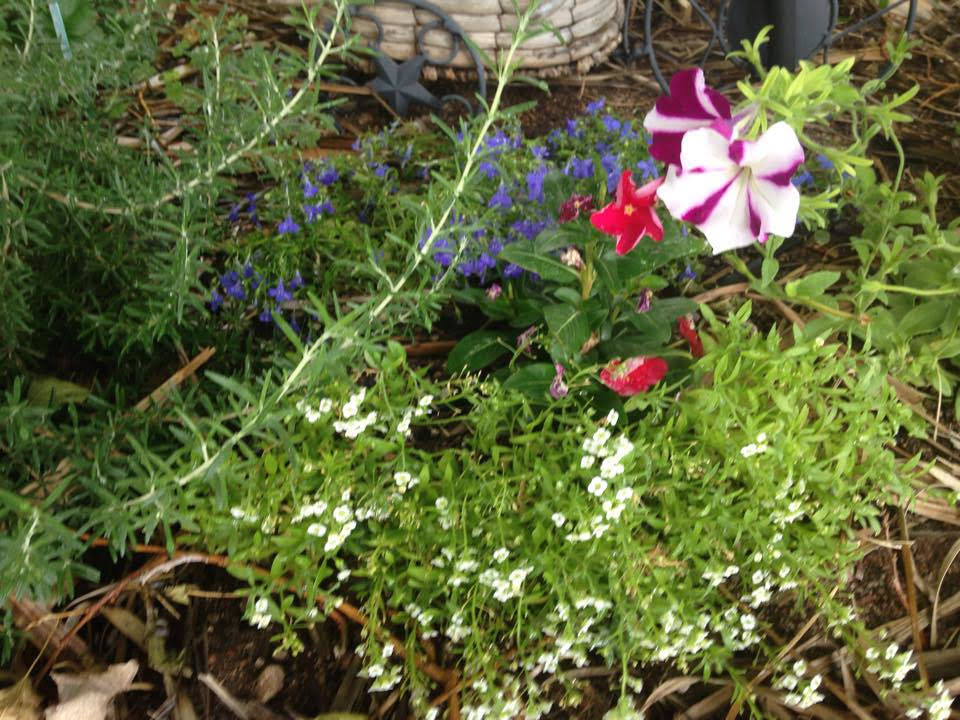IN SEASON: Celebrate the end of summer with a pop of patriotic color
Labor Day is nearly upon us and so too is the unofficial end of summer. For many this may mean barbecues and a dip in the pool. For gardeners it is a time to pull unproductive plants, make our fall garden plans, and freshen summer-worn flower beds.
I like to dedicate at least one flower bed each year to a color scheme of red, white, and blue. With cooler temps on the horizon there are a dizzying array of blooming annual flowers returning to our local nurseries that will refresh and enhance any flower bed from the end of summer well into the early days of winter.
Arrange flowers to maximize beauty
When arranging a red, white, and blue themed flower garden, whether in a container or in the ground, I like to make the red flowers the central focal piece. I tend to place taller blue flowers behind the red flowers and then place a low-growing white flower at the around the base of the red and blue flowers.
Green foliage and often herbs such as rosemary provide accents to break up the color scheme a bit.
If using a container, I like to keep it simple. I may choose a rustic metal bin or a simple and elegant white clay pot. I really want the flowers to be the main attraction and not the container that they are in. If blue flowers are hard to find, red and white flowers in a blue glazed pot will have a similar effect.
Beyond the flower choices, I may dress up the flower arrangement even further with small flags, pinwheels, and other patriotic décor found at craft or discount stores.
Flower choices to fit color theme
I like to begin by picking out the blue flowers as those can be the hardest to find. Some easy choices that are widely available in our area are salvia and lobelia.
Salvia flowers are dramatic colorful spikes that sit atop dense green foliage at a height of between 2 to 3 feet high. They are closer to purple than blue but fit in nicely with a red, white and blue themed flower bed. They are perennials that bloom from spring through summer and are hardy in our climate and drought-tolerant.
Lobelia is a delicate little flower that creeps along the ground and rarely reaches any taller than 5 inches. Lobelia is an annual that thrives from early spring to early winter and does better in cool weather than our extreme summer heat. Though it is an annual, there have been a few occasions that they have survived for more than a year in my garden.
You have a lot more options when it comes to white flowers and accents. If you would like a perennial flower that can serve as an anchor, as annual flowers come and go, look no further than zonal geraniums. Their large clusters of semi-double flowers bloom from spring through fall, though they need afternoon shade during the extreme summer heat.
Another option, and my personal favorite, is sweet alyssum, also known as carpet flower. This low-growing groundcover spreads to a circumference of 6 to 9 inches and many should be planted together for complete cover. Their tiny, white, delicate flowers form a carpet and are a wonderful accent almost anywhere in a garden.
Often, they will bloom as a mix of white and blue-hued petals which make them a perfect transition piece in a red, white, and blue themed flower bed. Sweet alyssum prefers cool temperatures and thrives in fall and winter, though I have had success with growing them in summer when planted in the shade of trellised vining tomatoes. Lobelia is a perennial in our growing zone.
Another low-growing white accent flower that is hardier than lobelia is bacopa. Bacopa comes in varieties of white and blue flowers, though the white variety is what you are more likely to find in our local garden stores. It has a trailing habit and looks especially lovely hanging over the edge of a flowerpot or raised bed. Bacopa thrives in warm weather and is not as tolerant of the cold as lobelia. It is an annual in our garden zone.
The varieties listed here are just a few of the options available when it comes to red, white, and blue flowers that would fare well in a late summer through fall garden. There are many more available, especially if you decide to start your own from seed. Part of the fun of growing a garden is experimenting from year to year to see what does well for you.
Once the heat of summer passes and cooler fall temperatures draw you outdoors, you’ll surely enjoy the final blaze of colors that you take the time to plant now, as the autumn landscape turns to yellow and brown hues.
Terri Meehan is the Founder of Southern Nevada Gardening Association a regional group. She is a garden mentor and local farmer in Pahrump. Send questions or comments to her at sonvgarden@gmail.com

















